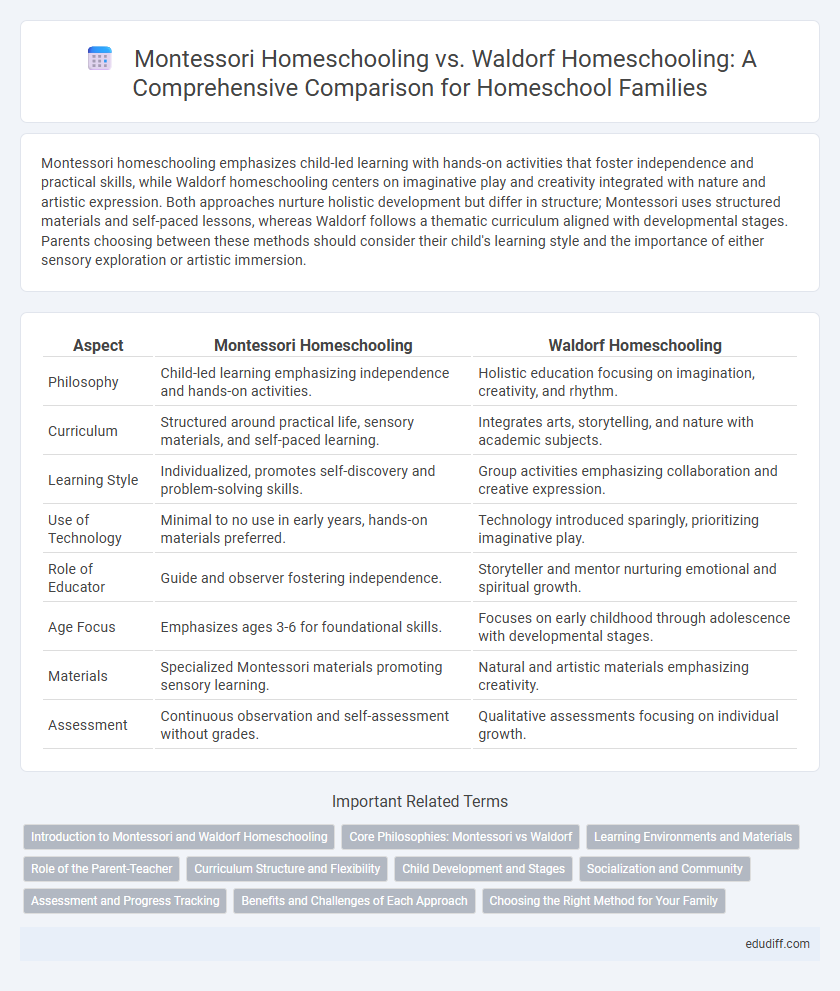Montessori homeschooling emphasizes child-led learning with hands-on activities that foster independence and practical skills, while Waldorf homeschooling centers on imaginative play and creativity integrated with nature and artistic expression. Both approaches nurture holistic development but differ in structure; Montessori uses structured materials and self-paced lessons, whereas Waldorf follows a thematic curriculum aligned with developmental stages. Parents choosing between these methods should consider their child's learning style and the importance of either sensory exploration or artistic immersion.
Table of Comparison
| Aspect | Montessori Homeschooling | Waldorf Homeschooling |
|---|---|---|
| Philosophy | Child-led learning emphasizing independence and hands-on activities. | Holistic education focusing on imagination, creativity, and rhythm. |
| Curriculum | Structured around practical life, sensory materials, and self-paced learning. | Integrates arts, storytelling, and nature with academic subjects. |
| Learning Style | Individualized, promotes self-discovery and problem-solving skills. | Group activities emphasizing collaboration and creative expression. |
| Use of Technology | Minimal to no use in early years, hands-on materials preferred. | Technology introduced sparingly, prioritizing imaginative play. |
| Role of Educator | Guide and observer fostering independence. | Storyteller and mentor nurturing emotional and spiritual growth. |
| Age Focus | Emphasizes ages 3-6 for foundational skills. | Focuses on early childhood through adolescence with developmental stages. |
| Materials | Specialized Montessori materials promoting sensory learning. | Natural and artistic materials emphasizing creativity. |
| Assessment | Continuous observation and self-assessment without grades. | Qualitative assessments focusing on individual growth. |
Introduction to Montessori and Waldorf Homeschooling
Montessori homeschooling emphasizes self-directed learning through hands-on activities and promotes independence by allowing children to explore materials at their own pace. Waldorf homeschooling focuses on imaginative play, storytelling, and artistic expression, nurturing creativity and holistic development aligned with Rudolf Steiner's educational philosophy. Both methods prioritize personalized education but differ in their approaches to structure, curriculum, and child development principles.
Core Philosophies: Montessori vs Waldorf
Montessori homeschooling emphasizes child-led learning through hands-on activities and fostering independence, guided by Dr. Maria Montessori's principles of mixed-age classrooms and self-paced progress. Waldorf homeschooling, founded on Rudolf Steiner's philosophy, centers on imaginative play, artistic expression, and integrating academics with nature and spiritual development to nurture the whole child. Both approaches prioritize holistic education but differ in structure, with Montessori focusing on sensory experiences and individual learning paths, while Waldorf emphasizes creativity and rhythm in daily routines.
Learning Environments and Materials
Montessori homeschooling emphasizes a structured environment with carefully designed, hands-on learning materials that promote independent exploration and self-discipline, such as sensory tools, practical life activities, and Montessori-specific educational aids. Waldorf homeschooling focuses on a natural, artistic setting infused with storytelling, imaginative play, and organic materials like beeswax crayons, natural fabrics, and wooden toys to nurture creativity and holistic development. The Montessori approach prioritizes order and measurement in materials, while Waldorf embraces fluid, nature-inspired tools that encourage emotional and spiritual growth.
Role of the Parent-Teacher
In Montessori homeschooling, the parent-teacher acts as a carefully trained guide, facilitating hands-on learning with a focus on self-directed activity and individualized pacing. Waldorf homeschooling emphasizes the parent-teacher as a nurturing storyteller and creative mentor who integrates artistic expression and rhythm into daily lessons. Both methods require parents to deeply understand child development stages to tailor educational experiences effectively.
Curriculum Structure and Flexibility
Montessori homeschooling emphasizes a child-led curriculum with hands-on activities, allowing for individualized pacing and adaptive learning materials, fostering independence and exploration. Waldorf homeschooling follows a structured, age-specific curriculum centered on artistic expression, storytelling, and rhythmic routines, creating a holistic and imaginative learning environment. Both approaches offer flexibility in daily schedules but differ in their pedagogical strategies and content organization.
Child Development and Stages
Montessori homeschooling emphasizes individualized learning with a focus on sensory exploration and practical life skills, adapting activities to the child's developmental stages from infancy to adolescence. Waldorf homeschooling centers on holistic growth, integrating artistic, imaginative play and rhythm-based routines to support emotional and cognitive development through distinct age phases. Both methods prioritize child-centered approaches but differ in their utilization of structured materials versus creative expression to foster developmental milestones.
Socialization and Community
Montessori homeschooling emphasizes mixed-age group interactions and collaborative problem-solving to foster independent social skills and a sense of community. Waldorf homeschooling integrates artistic group activities, storytelling, and seasonal festivals to cultivate emotional connections and collective cultural experiences. Both approaches prioritize socialization within a close-knit, values-driven community, but Montessori focuses on individual autonomy while Waldorf stresses shared creativity and rhythm.
Assessment and Progress Tracking
Montessori homeschooling emphasizes self-directed learning with ongoing, individualized assessment through observation and practical activities that allow children to progress at their own pace. Waldorf homeschooling relies on qualitative assessment, focusing on developmental stages and artistic expression, with progress tracked through narrative evaluations and portfolio reviews rather than standardized testing. Both methods prioritize holistic growth but differ fundamentally in how they record and interpret student development.
Benefits and Challenges of Each Approach
Montessori homeschooling emphasizes self-directed learning and hands-on activities, promoting independence and experiential education but may challenge parents with the need for specialized materials and training. Waldorf homeschooling fosters creativity, imagination, and holistic development through art, music, and storytelling, yet requires significant parental involvement and adherence to a structured, developmental curriculum. Both approaches support individualized learning but differ in their educational philosophies and implementation demands on families.
Choosing the Right Method for Your Family
Montessori homeschooling emphasizes hands-on learning and individualized pacing, nurturing children's natural curiosity through practical life activities and sensory exploration. Waldorf homeschooling centers on creativity, imagination, and holistic development, integrating arts, storytelling, and rhythm into the curriculum for balanced cognitive and emotional growth. Families should assess their child's learning style and their own educational goals to select the method that best supports personalized engagement and development.
Montessori Homeschooling vs Waldorf Homeschooling Infographic

 edudiff.com
edudiff.com